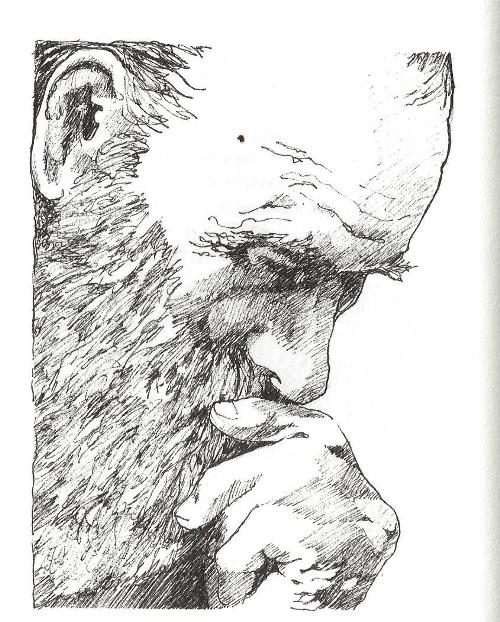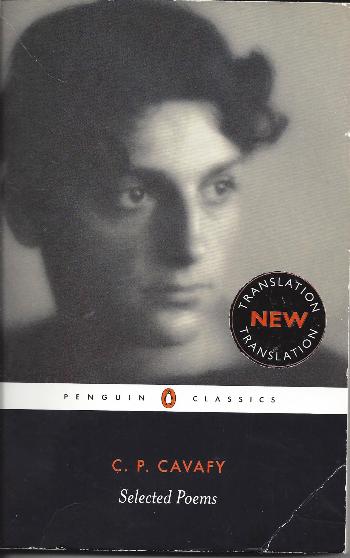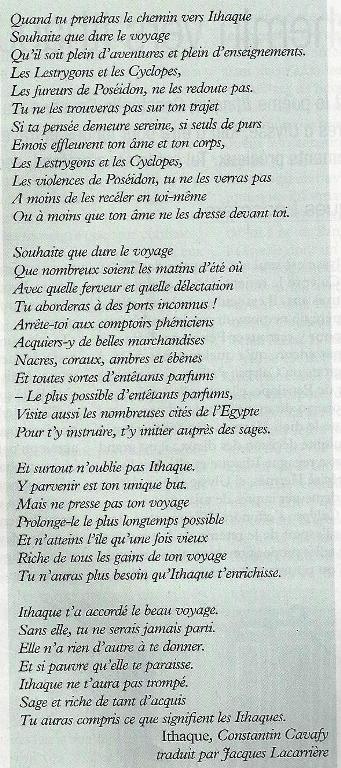|
|
|
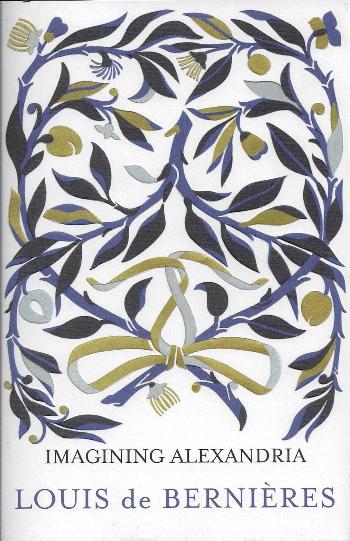
Tính dịch
bài thơ “Về Xề Gòn gặp Cớm VC làm quái gì” [Ithaca]
của nhà thơ Cavafis, cùng bài viết thần sầu của Vargas Llosa, về nhà
thơ
"ghê" này, nay vớ được cuốn thơ trên cũng OK lắm.
Bernières là
tác giả “Captain Corelli's Mandolin”, rất nổi tiếng, đã chuyển thể
thành phim
và cái cuốn khác nữa.
THE
REGRET OF
AN OLD MAN
I knew you
before, when we were young,
You a temple maid and I an idle man.
I saw you
pass in white, a circlet on your head,
And in your hands the blood-filled golden bowl.
I do confess I loved the slender grace
That still
you have today.
I caught
your eye and smiled. Then,
When all were glad or sick with wine
I took you
to a rock and there I tried to take you.
You refused and ran.
I am glad we
meet again. I doubt if you remember.
Such a long time. I was born a fool. I have always been
sorry.
You were
young and lovely. I was an idle man.
Nỗi ân hận của
1 anh già
Ta biết em từ
xưa, khi em còn bé tí
Và ta, 1 thằng
thanh niên đại lãn, biếng nhác
Ta nhìn thấy
em, khi đó là 1 cô tớ gái quanh quẩn nơi quán, miếu, hay chùa làng
Em đi qua đường,
đầu chit tấm băng đô
Bưng tô vàng
đựng huyết
Ta phải thú
thiệt, ta cảm em liền
Bởi cái mảnh
khảnh duyên dáng của em
Mà bi giờ vưỡn
còn
Mắt ta bắt
được ánh mắt của em và mỉm cười
Cả hai đều
vui, và bịnh vì bia bọt
Ta lôi em vô
chỗ có hòn đá bự, và tính làm thịt em
Em đá cho ta
1 phát, và bỏ chạy!
Hà, hà!
Ta rất mừng
vì gặp lại em. Ta đoán là em chẳng còn nhớ chuyện nhơ bửn đó.
Lâu quá rồi,
làm sao nhớ.
Ta sinh ra là
đã khùng rồi
Nhưng ta luôn
luôn cảm thấy ân hận
Em trẻ
quá, xinh quá,
Còn ta, 1 thằng
thanh niên lười biếng.
Note: Bức
hình y chang bức hình bìa cuốn thơ bộ lạc Cờ Lăng làm quà cho Cà, sau
khi chàng
thổi Ông Số 2 một chùm bài!
Bài thơ cũng…. y chang!
Hà, hà!
Lại nhớ những
buổi ngồi đợi Viên Linh, lãnh tí tiền còm, tại văn phòng Thời Tập.
Thằng đói cơm
đen. Thằng đói gái
Cũng y
chang!
VL bảnh thật.
Thơ thường đếch có nhuận bút.
Nhưng với ai chứ với Cà, thì, ngoại lệ!
Ám ảnh
phố phường
Dầu có muốn
hay không, thì vẫn phải thừa nhận, Du Tử Lê là một tên tuổi. Tôi thích
đọc Du Tử
Lê, những bài thơ mang đậm nét đèn vàng phố thị hay hiu hắt tóc xanh.
Hầu như
trong giới viết lách ở Sài Gòn, ít nhiều đều thuộc vài câu thơ của Du
Tử Lê. Thế
nên, khi nghe nhà văn, nhà báo Đoàn Thạch Hãn buột miệng nói: “Tôi với
Lê thân
lắm”, thì tôi vội vã gửi lời nhờ: “Khi nào chú Lê có dịp về lại Việt
Nam, chú
cho con gặp với”.
Hạnh ngộ, chỉ có
bấy nhiêu.
Dầu có muốn
hay không thì vẫn phải thừa nhận…
Đúng là chơi với… cớm, cớm
liếm mặt!
“Tôi với Lê thân
lắm”: Câu này phải để đao phủ HPNT nói mới phải, bởi vì bạn ta đã từng
tự động
gõ cửa.. Trùm Địa Ngục Mậu Thân!
Người Xề
Gòn
The Alexandrian
Poetry, for
Cavafy, like pleasure and beauty, could not be brought publicly to.
light, nor
were such things within everyone's reach: they were available only to
those
daring enough to seek them out and cultivate them as forbidden fruits,
in
dangerous territory.
*
Louis de Bernières. Tác giả Captain
Corelli's Mandolin,
1994, tiểu thuyết. (2)
Trên số Ðiểm Sách Văn Học Á Châu, Asia Literary Review Mùa Thu 2010, đặc
biệt về Khờ Me Ðỏ, có hai bài thơ thật tuyệt của ông, viết giùm cho
GNV, gửi
BHD!
Poetry
Louis de Bernieres
Two poems written after
arriving in Hong Kong on the author's
first visit; March 2010
The Man Who
Travelled the World
He travelled the world,
restless as rain.
There was no continent unexplored,
Scarcely a city unworthy of days, a night, a week.
In all these places he searched for her face
In the streets, in the parks, in the lanes,
Always pausing to look, listening out
For the voice he'd never heard yet, yet
Always knew he would know.
So many lovers, so many
encounters,
So many years, so many lands.
Now he sits by the window, a cat in his lap,
An ancient man far off from the
place of his birth.
And inside that loosening frame of bones
Beats the same heart as the heart that
Beat in the young boy who knew she was there,
And set off to travel the world.
He thinks of the children he
never had,
The ordinary things foregone,
The perverseness of such an exhausting,
Such an impossible search;
A whole life squandered on dreams.
It begins to rain; he puts on his glasses
Looks through the window, watches the girls
Step by, avoiding the puddles, protecting
Their hair with their magazines.
He fondles the ears of the cat,
This ancient man far off from the place of his birth,
Still looking, still in fief to the same unsatisfied heart
As the heart that beat in the young boy
Who knew she was there, and
Set off to travel the world.
Put Out the Light
Close the shutters,
Put out the light,
Place one candle on the shelf
See, we are young again;
Our malformations, all life's
Etchings in our flesh are gone,
Are evened out, engoldened,
Softened by shadow.
Your hair smells sweet, your
Head in the crook of my arm, your
Hand on my chest.
We will lie like this til the candle dies,
And then, in the dark, lie face to face.
They'll glitter like moonlight on water,
Our old, experienced eyes.
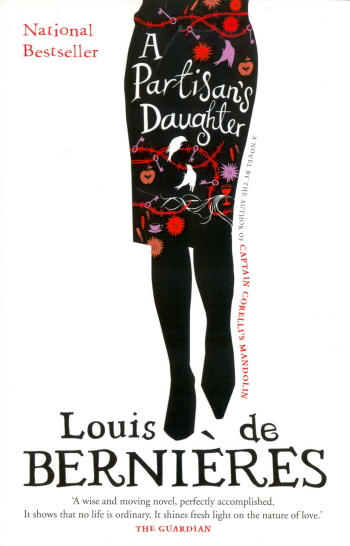 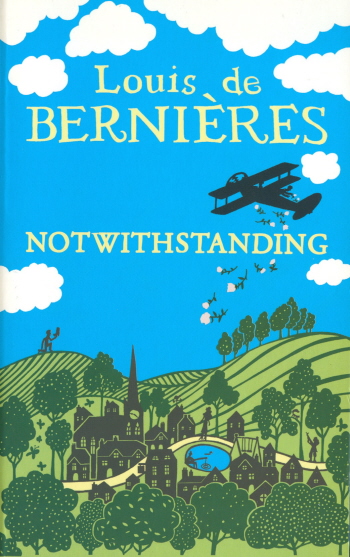
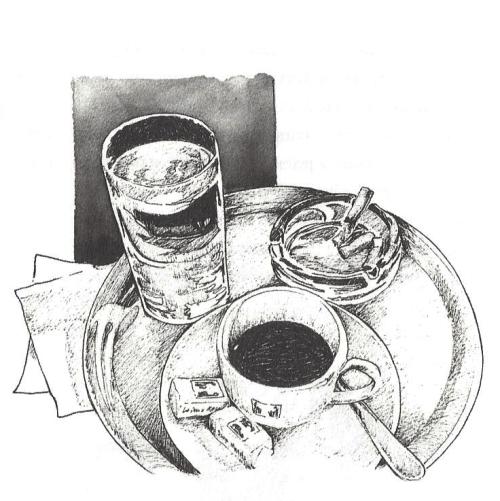
AT THE
SORBONNE
He walked
these streets the first time
(He was
young and handsome then)
With a woman
he betrayed,
And the
streets remind him of her golden hair,
Her easy
ways, the black stone set in the silver ring.
He bought
Montaigne, white sausage.
It was
Christmas. They'd bought a duck
And cooked
it badly.
These were
the times when
Intellectuals
gathered in cafés,
Avid for
seduction,
Talked of
revolution,
Ranged in
the Latin Quarter, smoked for the sake of style.
You might
perhaps run into Roland, Jean-Paul and Simone.
Georges was
writing songs.
It was after
Albert crashed and died.
There was no
hot water, this was Paris;
The sewage
breathed from the grates;
The women
went out with their poodles.
The coffee
was perfect, the cafes warm:
The Café
Rodin
The Café
Louvre
The Café Jeu
de Paumes.
They kissed
in the dark, oblivious;
They kissed
in the light, in public, mischievous.
They made
love and made love and made love;
Youth
eternal, the hunger immense,
The years
ahead so long,
Faith and
hope unquenched.
When they
came home the pipes were iced;
The cats
brought gifts of rabbits,
Voles and
mice and woodcock.
They boiled
a kettle, melted the ice,
Lit the
fire, went out and ate,
Came back to
shivering sheets.
Later,
betrayal. It all came later;
Her
penitential tears, her hair falling about her eyes,
Her features
crooked with remorse, her musician's hands
Trembling on
his shoulders.
He was correct
and stiff, but
Found it
easy to forgive.
He was
grateful, after a fashion;
It gave him
his excuse.
When he
considers the many, the substitutes
Who left,
reciting their lists of lovers;
When he
walks these streets,
Scarcely
believing the slippage,
He then
remembers the gold-haired girl,
With her
easy ways, her musician's hands,
Her
penitential tears, her kisses.
Louis de
Bernières: Imagining Alexandria
Ithaca
Thơ, với
Cavafy, như lạc thú và cái đẹp, đám mắt trắng dã - quần chúng, đám
đông, tập thể…- không thưởng thức được,
những
thứ đó không
ở trong tầm tay của mọi người: chúng chỉ có đó, cho những con người đủ
“dám” để mà khui, móc chúng ra, và trồng trọt,
săn sóc chúng như là những trái cấm, trong 1 khoảnh đất nguy hiểm.
Poetry, for
Cavafy, like pleasure and beauty, could not be brought publicly to
light, nor were
such
things within everyone‘s reach: they were available only to those
daring enough
to seek them out and cultivate them as forbidden fruits, in dangerous
territory.
Vargas
Llosa: The Alexandrian
Bài viết về
Cavafy của Vargas Llosa, Gấu đọc cũng lâu rồi, cũng tính giới thiệu với
độc giả
TV, nhưng lại quên đi. Mới đây, đọc bài trên tờ Books về Cavafy, cũng
thú lắm:
Những người khuân vác mộng. Chắc là phải đi 1 đường về ông thi
sĩ "ghê"
này thôi.
Ithaca
ULYSSE PASSE
DEVANT ITHAQUE
Qu'est-ce
que ces rochers, ce sable? C'est Ithaque,
Tu sais
qu'il y a la l'abeille et l'olivier
Et l'épouse
fidèle et le vieux chien,
Mais vois,
l'eau brille noire sous ta proue.
Non, ne
regarde plus cette rive! Ce n'est
Que ton
pauvre royaume. Tu ne vas pas
Tendre ta
main à l'homme que tu es,
Toi qui n'as
plus chagrin ni esperance.
Passe, décois.
Qu'elle fuie à ta gauche! Voici
Que se
creuse pour toi cette autre mer,
La mémoire
qui hante qui veut mourir.
Va ! Garde désorrnais
le cap sur l'autre
Rive basse,
là-bas! Où, dans l'écume,
Joue encore
l'enfant que tu fus ici.
Yves
Bonnefoy
ULYSSES PASSES ITHACA
What's this pile of rocks
and sand? Ithaca ...
You know you'll find the bees, the ancient dog,
The olive tree, the faithful wife. But look:
The water glitters, black under your prow.
No, don't waste another
glance: this coast
Is just your threadbare kingdom. You won't
Shake the hand of the man you are now-
You who've lost all sorrow, and all hope.
Sail on, disappoint them.
Let the island slip by,
Off to port. For you, this other sea unrolls:
Memory haunts the man who wants to die
Speed ahead. From this day
on, set your course
For that low, huddled shore. There, in the foam,
Plays the child that you once were, here.
Ulysse đi ngang Xề Gòn
Cái đống kè đá, cát kiết
kia là cái gì hử? Xề Gòn đó.
Mi biết mà, ở đó có đàn ong, có con chó già
Có cây ô liu và bà vợ trung thành
Nhưng coi kìa, dòng nước long lanh, đen thui, dưới mũi thuyền
Không, đừng nhìn bờ sông
nữa
Thì đúng vưỡn chỉ là cái vương quốc khốn khổ của mi ngày nào
Mi sẽ chẳng thể bắt tay cái kẻ là mi bây giờ
Mi, kẻ đếch còn đau buồn, hy vọng
Dong buồm tếch thôi, kệ
cha Xề Gòn và
những con người của nó đang từ từ trôi xa ở phía mạn trái thuyền
Một biển khác, một Xề Gòn khác đang chờ mi
Hồi ức săn đuổi kẻ nào muốn chết
Tăng tốc thuyền, kể từ
ngày hôm nay
Hướng về một Xề Gòn khác, kè đá khác
Hãy nô đùa với đứa trẻ, là mi, ngày nảo ngày nào
Cái ngày mà mi còn Xề Gòn của mi
Bài thơ, nguyên
tác tiếng Tẩy. Nay coi lại, post thêm cho đủ bộ.
Bèn [sẽ] đi thêm, Bông Hồng Độc Nhất, La Seule Rose, The
Only
Rose, và ba kỷ niệm của Yves Bonnefoy, về Borges, trong có nhắc tới
1
truyện ngắn thần sầu của Hawthorne. Quả đúng là thần sầu. Làm Gấu nhớ
tới
cái truyện ngắn về người khách lạ, mà Gấu đọc cùng với bà cụ TTT, những
ngày còn đi học, The
Ambitious Guest.
*
Thơ, với
Cavafy, như lạc thú và cái đẹp, đám mắt trắng dã - quần chúng, đám
dông, tập thể…- không thưởng thức được,
những
thứ đó không
ở trong tầm tay của mọi người: chúng chỉ có đó cho những con người đủ “dám” để mà khui, móc chúng ra, và trồng trọt,
săn sóc chúng như là những trái cấm, trong 1 khoảnh đất nguy hiểm
Poetry, for
Cavafy, like pleasure and beauty, could not be brought public, nor were
such
things within everyone‘s reach: they were available only to those
daring enough
to seek them out and cultivate them as forbidden fruits, in dangerous
territory
Vargas
Llosa: The Alexandrian
Bài viết
về
Cavafy của Vargas Llosa, Gấu đọc cũng lâu rồi, cũng tính giới thiệu với
độc giả
TV, nhưng lại quên đi. Mới đây, đọc bài trên tờ Books về Cavafy, cũng
thú lắm:
Những người khuân vác mộng. Chắc là phải đi 1đường về ông thi sĩ "ghê"
này thôi.
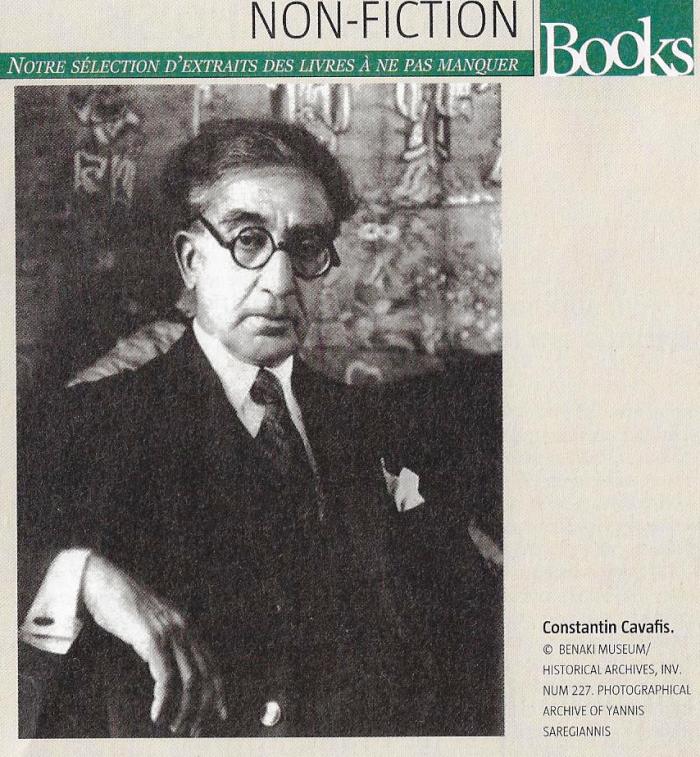
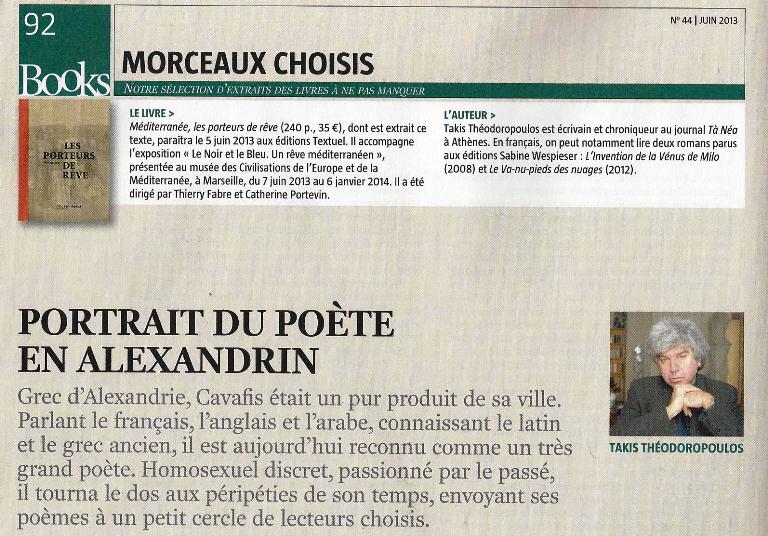
Ithaca
When you
start on your way to Ithaca,
pray that
the journey be long,
rich in
adventure, rich in discovery.
Do not fear
the Cyclops, the Laestrygonians
or the anger
of Poseidon. You'll not encounter them
on your way
if your thoughts remain high,
if a rare
emotion possesses you body and soul.
You will not
encounter the Cyclops,
the
Laestrygonians or savage Poseidon
if you do
not carry them in your own soul,
if your soul
does not set them before you.
Pray that
the journey be a long one,
that there
be countless summer mornings
when, with
what pleasure, what joy,
you drift
into harbours never before seen;
that you
make port in Phoenician markets
and purchase
their lovely goods:
coral and
mother of pearl, ebony and amber,
and every
kind of delightful perfume.
Acquire all
the voluptuous perfumes that you can,
then sail to
Egypt's many towns
to learn and
learn from their scholars.
Always keep
Ithaca fixed in your mind.
Arrival
there is your destination.
Yet do not
hurry the journey at all:
better that
it lasts for many years
and you
arrive an old man on the island,
rich from
all that you have gained on the way,
not counting
on Ithaca for riches.
For Ithaca
gave you the splendid voyage:
without her
you would never have embarked.
She has
nothing more to give you now.
And though
you find her poor, she has not misled you;
you having
grown so wise, so experienced from your travels,
by then you
will have learned what Ithacas mean.
C. P.
CAVAFY: SELECTED POEMS
ULYSSES PASSES ITHACA
What's this pile of rocks
and sand? Ithaca ...
You know you'll find the bees, the ancient dog,
The olive tree, the faithful wife. But look:
The water glitters, black under your prow.
No, don't waste another
glance: this coast
Is just your threadbare kingdom. You won't
Shake the hand of the man you are now-
You who've lost all sorrow, and all hope.
Sail on, disappoint them.
Let the island slip by,
Off to port. For you, this other sea unrolls:
Memory haunts the man who wants to die
Speed ahead. From this day
on, set your course
For that low, huddled shore. There, in the foam,
Plays the child that you once were, here.
Yves Bonnefoy
Ulysse đi ngang Xề Gòn
Cái đống kè đá, cát kiết
kia là cái gì hử? Xề Gòn đó.
Mi biết mà, ở đó có đàn ong, có con chó già
Có cây ô liu và bà vợ trung thành
Nhưng coi kìa, dòng nước long lanh, đen thui, dưới mũi thuyền
Không, đừng nhìn bờ sông
nữa
Thì đúng vưỡn chỉ là cái vương quốc khốn khổ của mi ngày nào
Mi sẽ chẳng thể bắt tay cái kẻ là mi bây giờ
Mi, kẻ đếch còn đau buồn, hy vọng
Dong buồm tếch thôi, kệ
cha Xề Gòn và
những con người của nó đang từ từ trôi xa ở phía mạn trái thuyền
Một biển khác, một Xề Gòn khác đang chờ mi
Hồi ức săn đuổi kẻ nào muốn chết
Tăng tốc thuyền, kể từ
ngày hôm nay
Hướng về một Xề Gòn khác, kè đá khác
Hãy nô đùa với đứa trẻ, là mi, ngày nảo ngày nào
Cái ngày mà mi còn Xề Gòn của mi
Il ritorno d'Ulisse
Returning from a lengthy
trip
he was astonished to find
he had strayed to a country
not his place of origin
For all his encounters in
scattered spots
with the black paper hearts of men
shot by the arquebuse
his bow-and-arrow story
did not happen
Then there was Penelope's
Castilian grandmother
blocking his entry at the garden gate
wordless and busy with embroidery
Sure, the grandchildren
are smiling in the background
apparently better disposed
towards foreigners
Their furtive hopes
still almost too small
for the naked eye
(But the idea is good
and the noise far away
even the building)
Sebald: Qua
sông & Nước
Note: Bài thơ này làm nhớ
một, hai bài thơ trong Thơ Ở Đâu Xa, tả cảnh anh tù, nhà thơ,
sĩ quan VNCH, gốc Bắc Kít, về quê Bắc Kít ngày nào, và, tất
nhiên, còn làm nhớ bài thơ của TTY, Ta Về.
Ta Về
Trở về sau 1 chuyến dài
dong chơi địa ngục
Hắn kinh ngạc khi thấy mình lạc vô 1 xứ sở
Đếch phải nơi hắn sinh ra
Trong tất cả những cú gặp
gỡ ở những điểm này điểm nọ rải rác, tản mạn
Với những trái tim giấy đen của những người bị bắn bởi cây súng mút kơ
tông
Thì giai thoại, kéo cây cung thần sầu, bắn mũi tên tuyệt cú mèo, đếch
xẩy ra.
Và rồi thì có bà ngoại Tây
Bán Nhà của Penelope
Bà chặn đường dẫn vô vườn
Đếch nói 1 tiếng, và tỏ ra bận rộn với cái trò thêu hoa văn khăn tay
Gửi người lính trận vượt Trường Sơn kíu nước,
Này khăn tay này, này thơ này,
Đường ra trận mùa này đẹp nắm!
Hà, hà!
Tất nhiên rồi, chắc chắn
có lũ con nít
– không phải nhếch nhác kéo nhau coi tù Ngụy qua thôn nghèo –
chơi ở vườn sau, chúng có vẻ rất tự nhiên, mỉm cười với khách lạ
Những hy vọng ẩn giấu của
chúng
vẫn hầu như quá nhỏ nhoi,
với con mắt trần trụi
(Nhưng ý
nghĩ thì tốt
Và tiếng động thì xa
mặc dù tòa nhà) (2)
The Alexandrian
The apartment in
Alexandria where the poet Constantine Cavafy (1863-1933) lived the last
years of his life is in a run-down building in the center of the city,
on a street that was called Lepsius when the neighborhood was inhabited
by Greeks and Italians and is now called Charrn-el-Sheik. Some Greeks
are still in the area, to judge by a few signs in Hellenic script, but
what predominates everywhere is Arabic. The neighborhood has
deteriorated and is full of cramped alleyways, houses in ruins, and
potholed paths, and-a typical sign of poor neighborhoods in Egypt-the
residents have turned the roofs into stinking garbage dumps. But the
beautiful little rthodox church that the faithful attended in Cavafy's
time is still there, and the graceful mosque, too, and the hospital,
although the brothel that operated on the ground floor of his building
has disappeared.
The apartment is a small museum in the care of the
Greek consulate, and it must not get many visitors, to judge by the
sleepy boy who opened the door for us and stared at us as if we were
Martians. Cavafy is practically unknown in the city immortalized by his
poems, which are, along with the celebrated library burned to the
ground in antiquity and Cleopatra's love affairs, the best thing that
has happened to it since it was founded by Alexander the Great in 331
B.C. No streets are named after him and no statues memorialize him. Or
if they exist, they don't appear in the guidebooks and no one knows
where to find them. The apartment is dark, with high ceilings and
gloomy hallways, and it is furnished as circumspectly as it must have
been when Cavafy set up house here with his brother Peter in 1907. The
latter lived with him for just a year, then left for Paris. From that
moment on, Constantine lived here alone; and, it seems, with
unfaltering sobriety, so long as he remained within his apartment's
thick walls.
This is one of the settings for the less interesting
of Cavafy's lives, one that leaves no impression on his poetry and is
difficult for us to imagine when we read about it: the life of an
immaculately attired and unassuming bourgeois who was a broker on the
cotton exchange and worked for thirty years as a model bureaucrat in
the Irrigation Office of the Ministry of Public Works, where, as a
result of his punctuality and efficiency, he rose to the rank of deputy
manager. The photographs on the walls pay testimony to this civic
prototype: the thick tortoiseshell spectacles, the stiff collars, the
tightly knotted tie, the little handkerchief in the top pocket of the
jacket, the vest with its watch chain, and the cuff links in the white
shirt cuffs. Clean-shaven and well groomed, he gazes seriously at the
camera, like the very incarnation of the man without qualities. This is
the same Cavafy who died of cancer of the larynx and is buried in the
Greek Orthodox cemetery of Alexandria, among ostentatious mausoleums,
in a small rectangle marked by marble tombstones, which he shares with
the bones of two or three relatives.
In the small museum there is not a single one of the
famous broadsheets on which he published his first poems and which, in
insignificant printings-of thirty or forty copies-s-he parsimoniously
distributed to a few chosen readers. Nor are there any of the
pamphlets-there were fifty copies of the first, seventy of the
second-in which on two occasions he gathered a handful of poems, his
only works published in anything approaching book form in his lifetime.
The secrecy in which this august poet shrouded the writing of poetry
didn't only have to do with his homosexuality, a shameful failing in a
public functionary and petit bourgeois of that time and place who in
his poems expounded with such surprising freedom on his sexual
predilections; it had also, and perhaps especially, to do with his
fascination with the clandestine, the underground, the marginal and maudit
life that he slipped into from time to time and that he lauded with
unparalleled elegance. Poetry, for Cavafy, like pleasure and beauty,
could not be brought publicly to. light, nor were such things within
everyone's reach: they were available only to those daring enough to
seek them out and cultivate them as forbidden fruits, in dangerous
territory.
Of this Cavafy there is only a fleeting trace in the
museum, in a few undated little drawings scrawled in a school notebook,
the pages of which have been pulled out and stuck up on the walls
without any kind of protection: boys, or maybe the same boy in
different positions, showing their Apollonian silhouettes and erect
phalluses. This Cavafy I can imagine very well, and have imagined ever
since I read him for the first time in the translation of his poems by
Marguerite Yourcenar: the sensual and decadent Cavafy, whom E. M.
Forster discreetly hinted at in his 1926 essay and who became a mythic
figure in Lawrence Durrell's Alexandria Quartet. Here, in his
city, the cafés and tavernas of his poems are still thronged, and, as
in the poems, there are almost no women or heterosexual couples, I
don't know this for a fact, but I am sure that staged in them still,
amid the crowds of men-the air dense with the smell of Turkish coffee
and the clouds of smoke expelled by showy hookah smokers-are ardent
meetings, first encounters, and the monetary exchanges that precede the
fevered couplings of lovers of convenience in cheap rooms, their
sordidness and filth setting off the allure of exquisite bodies. I'd
even venture to say that I've witnessed it, on the terraces of The
Corniche or in the smoky hovels that surround the textile market: a
gentleman with a small sniffing nose, eager lips, and lustful little
eyes, at nightfall in the warm glow of the first stars and the sea
breeze, spying on the strapping young men who stroll with their
buttocks cocked, in search of clients.
Unlike the men-or, perhaps more accurately,
adolescents who love each other with serenity and ease in Cavafy's
poems, and enjoy sexual pleasure with the clear conscience of pagan
gods, Cavafy surely found these loves extremely difficult and
troubling, suffused at times with terror and always with frustrated
hopes. The astounding thing about his erotic poetry is that these
episodes-which must have been few and experienced under the terrible
strain of one who always kept up the appearance of respectability in
his public life and evaded scandal in any way he could-are transformed
into a kind of utopia: a supreme way of living and relishing life, of
escaping the bounds of the human condition and achieving a superior
form of existence, of attaining a kind of secular spiritual state. In
this state, through the pleasure of the senses and perceptions and the
appreciation of physical beauty, a human being ascends, like the
mystics in their divine trances, to the height of the gods, becoming a
god himself. Cavafy's erotic poems burn with an unbridled sexuality,
but despite that and their romantic trappings of decadence and
perdition, they are curiously cold, maintaining the rational distance
of an intelligence that governs the outpouring of passion and the
feasting of the instincts. At the same time that he represents this
ardor in verse, he observes it, studies it, and, with form as his tool,
perfects and eternalizes it.
His themes and his sexual inclinations are
infiltrated with nineteenth-century romanticism-excess and
transgression, aristocratic individualism-but at the moment he takes up
his pen and sits down to write, a classicist surges from the depths of
his being and seizes the reins of his spirit, obsessed with harmony of
form and clarity of expression, a poet convinced that deft
craftsmanship, clarity, discipline, and the proper use of memory are
preferable to improvisation and disorderly inspiration in reaching
absolute artistic perfection. He achieved that perfection: as a result,
his poetry is capable of resisting the test of translation-a test that
almost always vanquishes the work of other poets-so that it makes our
blood run cold in all its different versions, astounding even those of
us who can't read it in the demotic Greek and the Greek of the diaspora
in which it was written. (By the way, the most beautiful translation
into Spanish I've read of Cavafy's work is that of twenty-five poems by
the Spaniard Joan Ferrate. It was published by Lumen in 1970, in a
handsome edition illustrated with photographs, and, unfortunately, so
far as I know, it hasn't been reissued.)
This is the third Cavafy of the indissoluble
trinity: the one outside time who, on the wings of fantasy and history,
lived simultaneously under the yoke of contemporary Britain and twenty
centuries in the past, in a Roman province of Levantine Greeks,
industrious Jews, and merchants from all over the world, or a few
hundred years later, when the paths of Christians and pagans crossed
and recrossed in a heterogeneous society where virtues and vices
proliferated and divine beings and humans were almost impossible to
tell apart. The Hellenic Cavafy, the Roman, the Byzantine, the Jew,
leaps from one century to the next, from one civilization to another,
with the ease and grace of a dancer, always maintaining the coherence
and continuity of his movements. His world is not erudite at all,
although traces of his characters, settings, battles, and courtly
intrigues may be picked up in history books. Erudition sets a glacial
barrier of facts, explications, and references between information and
reality, and Cavafy's world has the freshness and intensity of life
itself, not life as it is lived in nature, but the enriched and
deliberate life-achieved without giving lip living-of the work of art.
Alexandria is always present in his dazzling poems,
because it is there that the events they evoke take place, or because
it is from the city's perspective that the deeds of the Greeks, Romans,
and Christians are glimpsed or remembered or yearned for, or because
the poet who invents and declaims is from there and wouldn't have
wanted to be from anywhere else. He was a singular Alexandrian and a
man of the periphery, a Greek of the diaspora who did more for his
cultural homeland-for its language and ancient mythology-than any other
writer since classical times. But how can a poet so thoroughly of the
Middle East-so identified with the smells, tastes, myths, and past of
his country of exile, that cultural and geographic crossroads where
Asia and Africa meet and are absorbed into each other as so many other
Mediterranean civilizations, races, and religions have been absorbed
into it-be so easily assimilated into the history of modern European
Greek literature?
All of those civilizations left traces on the world
created by Cavafy, a poet who was able to make another, different world
of all that rich historical and cultural material, one that is revived
and renewed each time we read him. Modern-day Alexandrians don't read
his poetry, and the vast majority don't even know his name. But when we
come here, the most real and tangible Alexandria for those of us who
have read him is not the beautiful beach, or the curve of the seaside
promenade, not the wandering clouds, the yellow trams, or the
amphitheater built with granite brought from Aswan, or even the
archaeological marvels of the museum. It is Cavafy's Alexandria, the
city where sophists discuss and impart their doctrines, where
philosophers meditate on the lessons of Thermopylae and the symbolism
of Ulysses's voyage to Ithaca, where curious neighbors come out of
their houses to watch Cleopatra's children-Caesarion, Alexander, and
Ptolemy-on their way to the Gymnasium, where the streets reek of wine
and incense when Bacchus passes by with his entourage just after the
mournful funeral rites of a grammarian, where love is a thing between
men, and where suddenly panic swells, because a rumor has spread that
the barbarians will soon be at the gates.
Alexandria, February 2000
Vargas Llosa: The
language of passion
|
|

